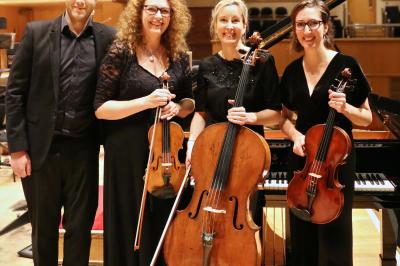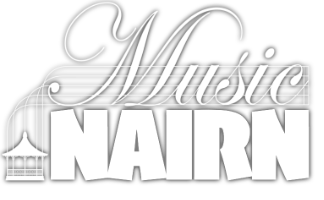Opera Winds
From the first rich chords of this Music Nairn concert by Opera Winds, it was clear why the Scottish Opera Orchestra always sounds so impressive – this was the orchestra's wind section liberated from the pit and demonstrating their considerable expertise and musicality. There were of course no recordings of opera in the 18th century, and the answer was the enormous vogue for Harmoniemusik, which allowed people to listen to their favourite opera music played by an octet of woodwinds and horns. Several excellent arrangements of Mozart's music were produced in his lifetime, and Opera Winds opened their concert with the bustling Overture to Mozart's 'Marriage of Figaro' arranged by Johann Wendt, establishing the superb ensemble, blend and precision which we would enjoy throughout the evening.
From actual Mozart to music built around Mozart's 'Marriage of Figaro' by the contemporary composer Jonathan Dove, his 'Figures in the Garden' (1991). The idea behind this piece, that Mozart's music had somehow left a musical residue in the Glyndebourne garden after the characters had left, was a fruitful one. Snatches of arias and recitative surfaced occasionally, most memorably when the ghost of the Countess sweeps to with the music of the Act II final ensemble. For me sadly, this was one of the few passages in a work which drew heavily on the wind writing of Stravinsky, Copland and Barber, that I found genuinely moving. Some of the other cameos, such as the rain shower, were imaginatively created, but too often this piece sounded gimmicky and perfunctory – a problem with many modern compositions for wind ensemble.
Fortunately this was very much not the case with the Octet by Ruth Gipps, a woman largely overlooked during her lifetime, but whose music is now reaching the wider audience it deserves. A student of Vaughan Williams, she wrote real music, making excellent use of the wind instruments to create a work of genuine musical profundity. This unfamiliar masterpiece was given a stirring and engaging performance by Opera Winds.
The second half opened with another Mozart Overture, this time the menacing introduction to 'Don Giovanni' in the arrangement by Josef Triebensee, followed immediately by the 'Rondino' by Beethoven, a charming work in which the two horns are given a starring role. I played the Beethoven as a student, and I was reminded of the subtlety and facility of his writing for winds. Next came a visit to 'The Medicinal Herb Garden' (2018) by Research Professor of Chemistry Emeritus, horn player, composer and conductor, Colin Suckling. This five-movement piece was also set in a garden, a medicinal garden in which the composer links medical complaints with their herbal cures. This may sound like an unpromising precept for music, but the piece
was an utter delight, with birdcalls and songs interweaving over beautifully crafted counterpoint, all exquisitely realised by the ensemble.
The programme concluded with 'Ein Musikalisches Snookerspiel' (1991) by Gary Carpenter, a work alluding to Mozart’s 'Musical Joke' as well as to the compositional dice game printed by Mozart's publisher and traditionally associated with Mozart. Carpenter's composition relied for its structure on random devices associated with an ongoing snooker game. While the idea was intriguing, and Mozart, who wrote his 'Kegelstatt Trio' in the gaps between playing skittles, would have approved, for me the considerable technical demands outweighed the musical content. I couldn’t help being impressed by the superb playing, but this was another piece which largely missed the mark for me. Fortunately, an encore of Mozart's 'Wedding Music' from 'Don Giovanni' returned us briefly to the delightful context of the 18th-century Harmonie, a world which I would like to have explored in more depth in the company of the excellent Opera Winds.
Forthcoming Events




